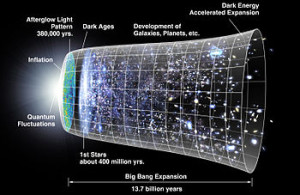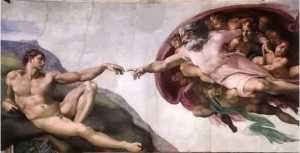
God is the supreme source of human dignity. His Son Jesus Christ, our Redeemer, became like us in all things except sin. His perfect sacrifice offered on our behalf to His Father gives us an opportunity to have an everlasting relationship with Him. Genesis 1:26-27 tells us we are made in the image and likeness of God and as such have transcendent worth and value. As human beings we alone among all other creatures are capable of knowing and loving God. Thus, human dignity is an intrinsic quality that cannot be taken away from us.
Unfortunately, a wholesale denial of God and His Commandments as exemplified by the forces of radical secularism can lead to an erosion of certain ethical principles and an attack against our God-given rights.
Before Creation, before time itself began, God for some mysterious reason decided to create the Universe. In one place our Catholic Liturgy comments that “God’s Love creates us.” Perhaps from our limited human perspective this may sum up why we are here.
Science tells us the process of the Creation of this Universe began some 13.7 billion years ago and the very vastness of our Universe was necessary to support life on a planet such as ours. Astronomer Hugh Ross quips, “Given the vast quantity and time and resources involved in creating a cosmic home for humanity…only one conclusion makes sense: The Creator of the cosmos places an extremely high value on and has a purpose for human beings.” In chapter 14 of his book The Creator and the Cosmos, Hugh Ross lists twenty six “parameters that the universe must have within narrowly defined ranges for life of any kind to exist.”
So the latest science postulates that the universe had a beginning at the precise moment of the “Big Bang” and it seems one may logically infer that everything that exists must have a cause. If you go back in time you cannot go back infinitely so you must arrive at the first cause. This first cause by necessity must, in itself, be uncaused. Nothing can exist without a cause except for God. Therefore, God exists. (Peter Kreeft, professor of philosophy at Boston College and The King’s College, gives a detailed explanation of the five proofs of God’s existence in an article entitled The First Cause Argument.) These proofs are based primarily on the teachings of ancient Greek philosophers and medieval theologians, e.g., Aristotle and St Thomas Aquinas. The latest cosmological science, postulating the “Big Bang”, supports the teachings and conclusions of these ancient minds.
So we have a God, Who out of an act of love creates an exquisitely fine-tuned Universe to support his creatures, culminating with the first man, Adam, our first common ancestor. The latest modern day science, using the forensic tools of DNA has posited the existence of the first man whom they nicknamed “Adam.” Spencer Wells, a geneticist and historian, used DNA technology to explore human history. He has traveled the world collecting blood samples in far-flung cultures. He sought to learn how closely we are related. Wells concluded that all human beings living on earth today are descendants from a single ancestor who lived some 60,000 years ago. This quest for “Adam” is an ongoing project undertaken in a partnership between IBM and the National Geographic Society. By analyzing genetic changes in the Y-chromosome of people in all regions of the world, Wells and his colleagues concluded that all humans alive today are descended from a single man. “We’re all effectively cousins, separated by 2,000 generations,” he said.

Now on August 12, 1950, Pius XII wrote an encyclical entitled HUMANI GENERIS (CONCERNING SOME FALSE OPINIONS THREATENING TO UNDERMINE THE FOUNDATIONS OF CATHOLIC DOCTRINE), which in part was written to combat the errors of Modernist theology which relies heavily on the theory of evolution. The Pope declared in paragraph 37 that Adam is the first true man and all human beings are his descendants. In this document the Pope also condemned polygenism which is defined as the theory that all human races descended from many ancestral types. This theory was born from a secularized interpretation of evolution in part to undermine the Scriptural account of Adam and Eve. However, the latest forensic DNA science used by The National Geographic genome project confirms that all humans are descendants from the one man, named “Adam.”
The book of Genesis gives us an account of the fall of the first Adam and as a result all human beings are part of his fall. We have inherited his sinful nature. This sets up the need for a New Adam to reconcile us with the Creator, God. Despite being a fallen race, God’s Love for humanity is so great that He devised a means whereby we may become reconciled to Him. In the passage of Romans 5:12-19 we see that Paul compares and contrasts Adam and Christ. While Adam filled the world with sin and misery, the grace of Christ (the New Adam) more than compensates for the damage done by the first Adam. Verse 18 reads, “Then as one man’s trespass led to condemnation for all men, so one man’s act of righteousness leads to acquittal and life for all men.” To reiterate, Christ more than compensates for the damage done by Adam’s rebellion.
The Incarnation of Jesus Christ is one of our Church’s greatest mysteries and underscores the extraordinary honor bestowed upon human dignity. At the moment of Christ’s conception in the womb of the Virgin, the Second Person of the Blessed Trinity assumed a human nature. The Catholic Catechism (CC) paragraph 468 tells us that the fifth ecumenical council, at Constantinople in 553, “confessed that ‘there is but one hypostasis [or person], which is our Lord Jesus Christ, one of the Trinity.’ Thus everything in Christ’s human nature is to be attributed to his divine person as its proper subject, not only his miracles but also his sufferings and even his death…’” God then could humble Himself taking the form of a suffering servant and die on the cross on our behalf. (Philippians 2:5-11) “The Church confesses that Jesus is inseparably true God and true man. He is truly the Son of God who, without ceasing to be God and Lord, became a man and our brother…” (CC paragraph 469)
Jesus Christ as true God and True Man greatly exalts human dignity. By becoming our brother, Christ reconciles us with His Father. With God as our Father we become His children and heirs of Heaven. (Romans 8:17 and Galatians 4:4-7)
The past century, and even to the present day, the world has witnessed the growing forces of radical secularism blatantly disobeying God’s commands, resulting in the violent death of hundreds of millions along with many more millions suffering the ravages of war, ethnic cleansing, famine and disease. Today, it is common to kill the babes in their mother’s wombs and declare it to be a good in the name “of a woman’s right to choose.” Likewise outrages such as same sex marriages are celebrated as one’s “civil rights”. The book of Isaiah (chapter 5:20) reads, “Woe to those who call evil good and good evil . . .”
However, the source of human dignity is a God, who created an exquisitely fine-tuned Universe for us to live in and created our common ancestor in His Own Image. When our ancestor sinned and died leading us into sin and death, the Love and the Grace of God through the merits of His beloved Son restores us to eternal life.
Given the great gift of our human dignity, how then can anyone harm or take the life of another, especially the most vulnerable, the babe in the womb? Remember that the Person of God resided in His mother’s womb for nine months thus sanctifying the lives of all the unborn. This was the beginning of His preparation to empty Himself on our behalf even to death on a Cross.
PS: The CC Paragraph 2270 tells us “Human life must be respected and protected absolutely from the moment of conception. From the first moment of his existence, a human being must be recognized as having the rights of a person – among which is the inviolable right of every innocent being to life.” Paragraph 2271 condemns abortion and goes on to say that any formal cooperation in an abortion constitutes a grave offense. “The Church attaches the canonical penalty of excommunication to this crime against human life. The Church does not thereby intend to restrict the scope of mercy. Rather, she makes clear the gravity of the crime committed, the irreparable harm done to the innocent who is put to death, as well as to the parents and the whole of society.”